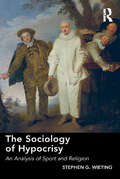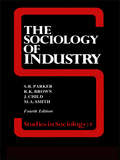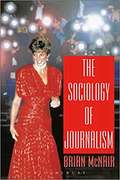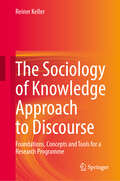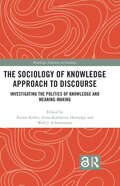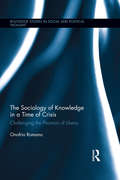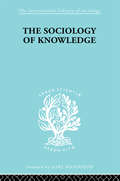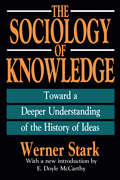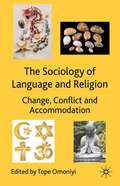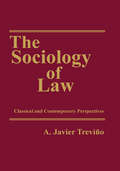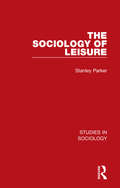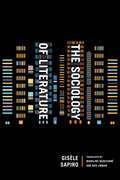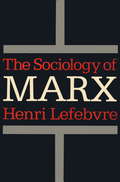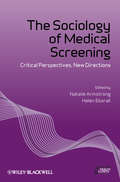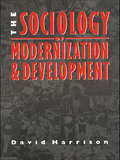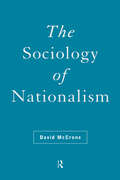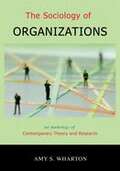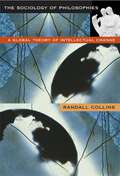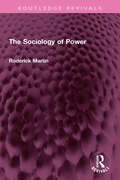- Table View
- List View
The Sociology of Hypocrisy: An Analysis of Sport and Religion
by Stephen G. WietingWith close attention to the spheres of sport and religion as important sites of moral currency, this book draws on media coverage of major cases of hypocrisy, attending to differing meanings and consequences of hypocrisy within the US, France and Iceland. Instances come from scandals within the established churches, as well as cases from the National Collegiate Athletic Association, the Tour de France, and the inquest into the Hillsborough Disaster in the UK. It considers the importance of the context within which moral conduct takes place and the relevance of this for the occurrence of hypocritical action, while exploring also the implications of advances in computer and information technology for controlling messages and monitoring deceit. Identifying the negative effects of the detection of hypocrisy at individual and institutional levels, the author engages with the work of Goffman to argue for the importance of trust in institutions, underlining the necessity of minimizing and correcting hypocritical acts by which this is undermined. A detailed study of hypocrisy and the need for trust, this volume will appeal to scholars and students of sociology with interests in social and moral conduct, sport, religion, Goffman and the notion of social life as artifice.
The Sociology of Industry (Studies In Sociology Ser. #Vol. 1)
by Richard Brown John Child Dr S ParkerThis book provides an excellent introduction to the sociology of industry. It comprises of three sections, which in turn address: the relation between industry and other sub-systems or institutions in society; the internal structure of industry and the roles people play within that structure; the social actions of individuals and groups within an organisational structure. It is an excellent resource for students of sociology who have an interest in its application to the ‘world of work’.
The Sociology of Intellectuals
by Patrick Baert Simon SusenThis volume offers an unprecedented account of recent and future developments in the sociology of intellectuals. It presents a critical exchange between two leading contemporary social theorists, Patrick Baert and Simon Susen, advancing debates at the cutting edge of scholarship on the changing role of intellectuals in the increasingly interconnected societies of the twenty-first century. The discussion centres on Baert's most recent contribution to this field of inquiry, The Existentialist Moment: The Rise of Sartre as a Public Intellectual (2015), demonstrating that it has opened up hitherto barely explored avenues for the sociological study of intellectuals. In addition, the authors provide an overview of various alternative approaches that are available for understanding the sociology of intellectuals - such as those of Pierre Bourdieu, Randall Collins, and Neil Gross. In doing so, they grapple with the question of the extent to which intellectuals can play a constructive role in influencing social and political developments in the modern era. This insightful volume will appeal to students and scholars of the humanities and social sciences, particularly to those interested in social theory and the history of intellectual thought.
The Sociology of Journalism
by Brian McNairJournalism is a privileged cultural form. It is the main source of our knowledge about the world and our place in it, and the point at which the individual and the social worlds meet. Referring to cases from both the US and UK, including the White House sex scandals and the death of Diana, this book examines the various factors involved in the making of contemporary journalism, including economic and political pressures, changes in the technology of news gathering and production, and the growing role of sources and "source strategies." The text analyzes how such factors come to exert influence on the form, content, and style of journalism, and reviews current approaches to the sociological impact of journalism on individuals, groups, and organizations.
The Sociology of Karl Mannheim: With a Bibliographical Guide to the Sociology of Knowledge, Ideological Analysis, and Social Planning (International Library Of Sociology)
by Gunter Werner RemmlingKarl Mannheim (1893-1947) occupies a prominent position among the leading social scientists of the twentieth century; his ideas and his books are relevant for many issues engaging the concern of sociologists today. Mannheim’s life spanned three cultural traditions – Hungarian, German and British – and in this authoritative study Professor Remmling covers all these phases in his life and work.Mannheim began as an idealistic philosopher, but soon began to make important contributions to the developing area of sociology of knowledge. After his emigration to England in 1933, Mannheim developed a theory of social planning to combat the socio-political consequences of the crisis of liberalism. During the Second World War his attention shifted to the ethical and religious values of Western humanism and the related role of mass education in democratic social planning. Finally, Mannheim forged the rudiments of a political sociology attacking the abuse of politico-military power and the resulting danger of a third world war, while simultaneously calling for counter-attack under the banner of planning for freedom on behalf of militant, fundamental democracy. In tracing these development in Karl Mannheim’s work, Gunter Remmling provides insights into major theoretical and practical issues of the first half of the twentieth century, problems which remain central to the modern experience.A comprehensive bibliography is provided to introduce the sociology of knowledge and related topics, such as ideology, utopia, intellectuals, Weimar culture, and social planning.
The Sociology of Knowledge Approach to Discourse: Foundations, Concepts and Tools for a Research Programme
by Reiner KellerIn this updated version of a contemporary classic of discourse research, Reiner Keller develops the theoretical and methodological foundations of the Sociology of Knowledge Approach to Discourse (SKAD). Translated from the original German into English for the first time, this book brings together two previously unconnected domains of knowledge analysis in social science: the rich traditions of sociology of knowledge and symbolic interactionism on one hand and the works of discourse studies, especially in relation to Michel Foucault, on the other. It presents a critical discussion of key developments in sociology of knowledge, symbolic interactionist, and related interpretive approaches, explains the communicational turn of recent work in the field, and examines how traditions within sociology of knowledge shifted focus or converged over time. Following this, the book discusses the development of discourse theory and discourse analysis since the 1960s, including critical discourse analysis, hegemony analysis, or cultural studies approaches. Embarking from a profound reconstruction of Michel Foucault’s work, the book then sets its own distinctive course by integrating major elements of Foucault’s perspective with the sociology of knowledge. Along this path, Reiner Keller establishes the heuristics and methodology for a sociology of knowledge approach to discourse, providing a comprehensive research programme for the study of social relations of knowledge and politics of knowledge. Since its first publication in 2005, SKAD has informed a multitude of studies worldwide and across several academic disciplines. Today it can be considered as one of the major perspectives in discourse research in social science and beyond.
The Sociology of Knowledge Approach to Discourse: Investigating the Politics of Knowledge and Meaning-making. (Routledge Advances in Sociology)
by Reiner Keller Anna-Katharina Hornidge Wolf J SchünemannThe Sociology of Knowledge Approach to Discourse (SKAD) has reoriented research into social forms, structuration and processes of meaning construction and reality formation; doing so by linking social constructivist and pragmatist approaches with post-structuralist thinking in order to study discourses and create epistemological space for analysing processes of world-making in culturally diverse environments. SKAD is anchored in interpretive traditions of inquiry and allows for broadening – and possibly overcoming – of the epistemological biases and restrictions still common in theories and approaches of Western- and Northern-centric social sciences. An innovative volume, this book is exactly attentive to these empirically based, globally diverse further developments of approach, with a clear focus on the methodology and its implementation. Thus, The Sociology of Knowledge Approach to Discourse presents itself as a research program and locates the approach within the context of interpretive social sciences, followed by eleven chapters on different cases from around the world that highlight certain theoretical questions and methodological challenges. Presenting outstanding applications of the Sociology of Knowledge Approach to Discourse across a wide variety of substantive projects and regional contexts, this text will appeal to postgraduate students and researchers interested in fields such as Discourse Studies, Sociology, Cultural Studies and Qualitative Methodology and Methods.
The Sociology of Knowledge in a Time of Crisis: Challenging the Phantom of Liberty (Routledge Studies in Social and Political Thought #92)
by Onofrio RomanoThe speed of social dynamics has overtaken the speed of thought. Adopting a dialectical perspective towards reality, social theory has always detected faults in the dominant social pattern, foreseeing crises and outlining in advance the features of new social models. Thought has always moved faster than reality and its ruling models, ensuring a dynamic equilibrium during modernity. Despite any dramatic social crisis, theory has always provided exit routes. The tragedy of current crisis lies in the fact that its social implications are exasperated by the absence of alternative views. This book identifies the causes of this mismatch between thought and reality, and illustrates a way out.
The Sociology of Knowledge: An Essay in Aid of a Deeper Understanding of the History of Ideas (International Library of Sociology)
by Stark F. WernerFirst Published in 1998. Routledge is an imprint of Taylor & Francis, an informa company.
The Sociology of Knowledge: Toward a Deeper Understanding of the History of Ideas (International Library Of Sociology Ser.)
by Werner StarkThis volume serves as both an introduction to the field of the sociology of knowledge and an interpretation of the thought of the major figures associated with its development More than a compendium of ideas, Stark seeks here to put order into what he regarded as a diffuse tradition of diverse bodies of thought, in particular the seemingly irreconcilable conflict between the study of the political element in thought identified here with Karl Mannheim and the investigation of the social element in thinking associated with the work of Max Scheler.The sociology of knowledge is primarily directed toward the study of the precise ways that human experience, through the mediation of knowledge, takes on a conscious and communicable shape. While both schools dealt with by Stark assume that the pursuit of truth is not purposeful apart from socially and historically determined structures of meaning, the tradition extending from Marx to Mannheim seeks to expose hidden factors that turn us away from the truth while that of Weber and Scheler attempts to identify social forces that impart a definite direction to our search for itIn order to reconcile opposing theoretical positions, Stark seeks to lay the foundations for a theory of the social determination of thought by directing his inquiry to the philosophical problem of truth in a manner compatible with cultural sociology. Stark's theoretical legacy to the sociology of knowledge is that social influences operate everywhere through a group's ethos. From this, many systems of ideas and social categories emanate, revealing partial glimpses of a synthetic whole.The outcome of Stark's work is a general theory of social determination remarkably consistent with contemporary interests in the broad range of cultural studies, whose focus is best described as the use of philosophical, literary, and historical approaches to study the social construction of meaning. The Sociology of Knowledge will be of great interest to social scientists, philosophers, and intellectual historians.
The Sociology of Language and Religion
by Tope OmoniyiThis is an eclectic collection of essays which successfully demonstrate how the Sociology of Language and Religion as a disciplinary paradigm responds to change, conflict and accommodation. The multiple religious coverage in the essays (Judaism, Christianity, Islam) as well as more or less global panorama.
The Sociology of Law: Classical and Contemporary Perspectives
by A. Javier TrevinoThe purpose of this book is to introduce the sociology of law by providing a coherent organization to the general body of literature in that field. As such, the text gives a comprehensive overview of theoretical sociology of law. It deals with the broad expanse of the field and covers a vast amount of intellectual terrain. This volume is intended to fill a gap in the literature. Most textbooks in the sociology of law are insufficiently theoretical or else do not provide a paradigmatic analysis of sociological theories.The content of this text consists of discussions of the works of scholars who have contributed the most to the cumulative development of the sociology of law. It surveys the major traditions of legal sociology but is not wedded to any one particular theoretical approach. Both the "classical," or nineteenth-century, and "contemporary," or twentieth-century, perspectives are covered. The reader will see that nineteenth-century thought has directly influenced the emergence of twentieth-century theory.One unique feature of this book is that key sociological and legal concepts, presented in bold print and italics, are defined, described, and illustrated throughout. Although the nature of the subject matter is highly theoretical and, at times, quite complex, Trevino values every effort to present the material in the most straightforward and intelligible form possible without compromising the integrity of the theories themselves. In short, this book aims to accomplish three objectives: inform about the progressive advancement of sociological theory, teach the reader to analyze the law as a social phenomenon, and develop in the reader a critical mode of thinking about issues relevant to the relationship between law and society.
The Sociology of Leisure (Studies in Sociology)
by Stanley ParkerIn the 1970s the subject of leisure was attracting interest among both social scientists and people concerned with developing recreation policies. A relative newcomer to the sociological scene at the time, leisure was beginning to compete in research effort and theory-building with the more established fields of sociology. As well as making an academic contribution, this book, originally published in 1976, provided practitioners (such as planners, administrators and managers) with an up-to-date and comprehensive review of social research finding over the whole field of leisure. Part One deals with the cultural context in which leisure, as we knew it, had developed, and includes the history of leisure in industrial society and the variety of ways in which people can experience leisure at various stages of the life cycle. In Part Two leisure is related to other spheres of life – work, the family, education and religion. Part Three relates academic to practical concerns of planning and providing for leisure, including factors in demand and supply. The final chapter examines what the sociology of leisure had to tell us about current trends in society and the directions of probable future change. The illustrative material, drawn from a wide variety of sources, is mainly British but also includes some contributions from the United States and other countries.
The Sociology of Literature
by Gisèle SapiroThe Sociology of Literature is a pithy primer on the history, affordances, and potential futures of this growing field of study, which finds its origins in the French Enlightenment, and its most salient expression as a sociological pursuit in the work of Pierre Bourdieu. Addressing the epistemological premises of the field at present, the book also refutes the common criticism that the sociology of literature does not take the text to be the central object of study. From this rebuttal, Gisèle Sapiro, the field's leading theorist, is able to demonstrate convincingly one of the greatest affordances of the discipline: its in-built methods for accounting for the roles and behaviors of agents and institutions (publishing houses, prize committees, etc.) in the circulation and reception of texts. While Sapiro emphasizes the rich interdisciplinary nature of the approach on display, articulating the way in which it draws on literary history, sociology, postcolonial studies, book history, gender studies, and media studies, among others, the book also stands as a defense of the sociology of literature as a discipline in its own right.
The Sociology of Marx
by Henri LefebvreThe crucial importance of Karl Marx's thought for his own time and for ours is beyond dispute, but the there have always been two considerable impediments to understanding: first, the supposed complexity with which Marx articulated his ideas; second, the accretions which commentators, disciples, and hagiographers have built into the original structure. Henri Lefebrve, who has held the chair in sociology at Strasbourg and since 1965 in Paris, has written an interpretative introduction which restores the clarity of outline and the vigor of the original. Lefebrvre also demonstrates by ample quotation that Marx, far from being the tortuous and intractable stylist we had imagined, is a masterful and witty writer. But beyond this, the reader is presented with a thesis. Lefebvre argues that Marx was not a sociologist, not an economist, not yet an historian or a philosopher. On the other hand, one can find in his writings a sociology, a political economy, a theory of history, and significant intimations of a philosophy. The explanation of this apparent paradox lies in the fact that Marx was writing in a period prior to the compartmentalizing of science, when the nature of things could still be grasped as a whole. Thus, through Marx, we can obtain a coherent picture of reality as it was at the inception of the modern age. An understanding of Marx is necessary for an understanding of our time. This book is indispensible not only as a guide to Marx, but for its sight into contemporary problems.
The Sociology of Medical Regulation
by John Martyn ChamberlainThis book provides a comprehensive examination of the complex issues surrounding the regulation of the medical profession. It offers up-to-date information on the current legislative framework and institutional arrangements surrounding the regulation in the United Kingdom. Well organized and written in an accessible way, it offers an insight into key sociological theories surrounding medical regulation. It gives a historically situated analysis of the contemporary relationship between medicine, the state and the public, and an overview of relevant social scientific research. Case studies highlight the practical or applied circumstances in which issues can occur. Readers will gain insight into possible future directions for medical governance.
The Sociology of Medical Screening: Critical Perspectives, New Directions (Sociology of Health and Illness Monographs #17)
by Natalie Armstrong Helen EborallThe Sociology of Medical Screening: Critical Perspectives, New Directions presents a series of readings that provide an up-to-date overview of the diverse sociological issues relating to population-based medical screening. Features new research data in most of the contributions Includes contributions from eminent sociologists such as David Armstrong, Stefan Timmermans, and Alison Pilnick Represents one of the only collections to specifically address the sociology of medical screening
The Sociology of Modernization and Development
by David Harrison"David Harrison writes very well, and presents a good, well-balanced and perceptive appraisal of current perspectives."--"Times Higher Education Supplement" This title available in eBook format. Click here for more information.Visit our eBookstore at: www.ebookstore.tandf.co.uk.
The Sociology of Nationalism: Tomorrow's Ancestors (International Library of Sociology)
by David McCroneIn recent years nationalism has emerged as one of the dominant issues of our time. In this lucid and balanced account, David McCrone lays out the key issues and debates around a subject which is too often obscured by polemic. Among topics covered are:* classical and contemporary theories of nationalism* nationalism and ethnicity* nationalism and the nation state* colonial and post-colonial nationalisms* neo nationalism and post communist nationalism.
The Sociology of Organizations: An Anthology of Contemporary Theory and Research
by Amy S. WhartonWharton's anthology provides an overview of contemporary theory and research in the sociology of organizations. Three features of this book are particularly distinctive: <p><p>* An emphasis on sociological content: Although the readings reflect the multidisciplinary and breadth of the organizations area, this anthology gives primary emphasis to selections with sociological content. Hence, the book should have strong appeal to instructors and students seeking a sociological understanding of organizations. <p><p>* Attention to contemporary theory and research: A unique feature of this anthology is its attention to contemporary theory and research on organizations. At the same time, Wharton grounds the book in the "modern classics." The readings reveal how organizational sociology contributes to our understanding of key social and economic issues, such as diversity, globalization, and the environment. <p><p>* Comprehensive, research-based, and methodologically diverse: The book is comprehensive in its coverage of topics, levels of analysis, and methodological approaches.
The Sociology of Philosophies
by Randall CollinsRandall Collins traces the movement of philosophical thought in ancient Greece, China, Japan, India, the medieval Islamic and Jewish world, medieval Christendom, and modern Europe. What emerges from this history is a social theory of intellectual change, one that avoids both the reduction of ideas to the influences of society at large and the purely contingent local construction of meanings. Instead, Collins focuses on the social locations where sophisticated ideas are formed: the patterns of intellectual networks and their inner divisions and conflicts.
The Sociology of Postmarxism (Routledge Advances in Sociology)
by Richard HowsonPostmarxism is often depicted as a point of intersection for a set of inter-disciplinary theories that are in themselves complex and dense. Bringing the postmarxist theory of Ernesto Laclau into the field of political sociology through a close reading and analysis of postmarxism and its relationship to ‘the social’, A Sociology of Postmarxism develops key postmarxist arguments in an engaging and sociologically applicable way. Indeed, through a threefold method of analysis, Howson first unpacks the relationship between ‘the social’ and ‘the political’ by analysing key allied theories to show where the points of connection occur. This is then followed by an insightful analysis of the key features of postmarxist theory such as antagonism and the inevitability of social dislocation, the political importance of hegemony; and the empty signifier thesis and equivalence to show how such theory can be applied at a sociological level. Finally, through the use of sociological categories such as masculinities, migration and social capital, the foregoing theoretical analyses are synthesised to show the social nature of postmarxism and particularly in the context of aspiration and co-operation. This enlightening volume will appeal to undergraduate and postgraduate students, as well as postdoctoral researchers who are interested in fields such as Political Sociology, Post Marxist Political Theory and Social Theory.
The Sociology of Power (Routledge Revivals)
by Roderick MartinFirst published in 1977, The Sociology of Power presents a broad comparative study in the sociology of domination by placing empirical research in political and industrial sociology in a comprehensive theoretical framework, derived from Marxism and social exchange theory. Roderick Martin argues that conventional definitions of ‘political sociology’ are no longer relevant, having been replaced by a revival of interest in wider problems, which need to be approached from new theoretical positions. He contends that what is needed is a more general definition, based on the analytical concepts of sociological theory. Three initial general chapters locate the study within the social action tradition and discuss problems of definition and measurement in detail. The major part of the book examines the distribution of power under different systems of labour exploitation-slavery, feudalism and especially capitalism. Professor Martin sees power as most concentrated in slavery, most dispersed in capitalism, and shows the extent and importance of this dispersal by a detailed discussion of power relations within industrial and political organizations, including trade unions and a critique of contemporary elitist theories. By reorienting political sociology around the concept of power and by analyzing the conventionally distinct fields of industrial and political sociology within a common theoretical framework, Roderick Martin offers a persuasive redefinition of the sociology of politics. This is a must read for scholars and researchers of sociology.
The Sociology of Progress (International Library of Sociology)
by Leslie SklairFirst published in 2002. Routledge is an imprint of Taylor & Francis, an informa company.
The Sociology of Religion
by Grace Davie"Davie accomplishes four things, any one of which would be worth the price of the book. First, she provides a clear, thorough review of theory and research in the sociology of religion, and argues successfully for its position as a central subdiscipline. Second, she displays an impressive command of comparative literature in the field, using French, British, and other European sources in addition to those from North American; this makes her presentation both wide and deep. . . Third, Davie underlines the importance of context, historical and geographical, for understanding how theory and case studies develop. . . Finally, the author's endnotes and her extensive bibliography give excellent guidance to beginning and experienced readers alike. " -C. Hendershott, New School University Why is religion still important? Can we be fully modern and fully religious? This book, written by one of the leading figures in the field, works at two levels. First it sets out the agenda “ covering the key questions in the sociology of religion today. At the same time, it interrogates this agenda “ asking if the sociology of religion, as we currently know it, is fit for purpose ". If not, what is to be done? In a single volume Grace Davie captures the nature and forms of modern religion, the current debates in the field and the prospects for future development.
